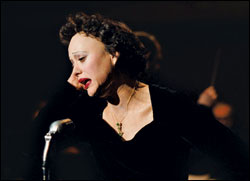 Composer/keyboardist/producer Elodie Lauten creates operas, music for dance and theatre, orchestral, chamber and instrumental music. Not a household name, she is however widely recognized by historians as a leading figure of post-minimalism and a force on the new music scene, with 20 releases on a number of labels.
Composer/keyboardist/producer Elodie Lauten creates operas, music for dance and theatre, orchestral, chamber and instrumental music. Not a household name, she is however widely recognized by historians as a leading figure of post-minimalism and a force on the new music scene, with 20 releases on a number of labels.
Her opera Waking in New York, Portrait of Allen Ginsberg was presented by the New York City Opera (2004 VOX and Friends) in May 2004, after being released on 4Tay, following three well-received productions. OrfReo, a new opera for Baroque ensemble was premiered at Merkin Hall by the Queen's Chamber Band, whose New Music Alive CD (released on Capstone in 2004) includes Lauten's The Architect. The Orfreo CD was released in December 2004 on Studio 21. In September 2004 Lauten was composer-in-residence at Hope College, MI. Lauten's Symphony 2001, was premiered in February 2003 by the SEM Orchestra in New York. In 1999, Lauten's Deus ex Machina Cycle for voices and Baroque ensemble (4Tay) received strong critical acclaim in the US and Europe. Lauten's Variations On The Orange Cycle (Lovely Music, 1998) was included in Chamber Music America's list of 100 best works of the 20th century.
Born in Paris, France, she was classically trained as a pianist since age 7. She received a Master's in composition from New York University where she studied Western composition with Dinu Ghezzo and Indian classical music with Ahkmal Parwez. Daughter of jazz pianist/drummer Errol Parker, she is also a fluent improviser. She became an American citizen in 1984 and has lived in New York since the early seventies
|
|
|
|
|

Wednesday, February 21, 2007
Kid Sparrow

In Paris for a few days I caught the premiere of the new Edith Piaf film by Olivier Dahan. It is called La Môme Piaf. It surprised me by its unique, non-linear structure. Instead of a typical biopic developing in chronological order, this one is completely broken up into sequences of her early life and later life, going back and forth at different periods, and this makes the film all the more interesting, as it emphasizes the most intensely emotional moments - her life being split into snapshots as they are caught and encapsulated into her songs - a team of songwriters is hard at work here making myth and reality coincide.
A new actress, Marion Cotillard (you can’t get any more French than this name) will certainly garner much praise for her character interpretation. Apparently, Olivier Dahan researched his film for several years. His rendition is both elegant and unusual. Even the old Piaf songs that we have heard a million times are only hinted at, presented in short snippets, emphasizing a particular moment. With this kind of film one cannot help wonder about the frailty of being an icon. In Edith Piaf’s case, it is the myth of the tramp who becomes a lady - but not just in form as the Cockney Eliza in Shaw's Pygmalion, but in content as well. Edith is raw, she may act vulgar but her feelings are noble. She drinks and drugs herself, she falls, but her sincerity is ever faultless. Why is great artistry so often accompanied by personal tragedy? Piaf could easily qualify as the Van Gogh of French song.
posted by Elodie Lauten
5:42 PM
| |



